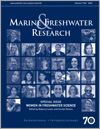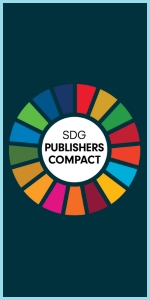
Marine and Freshwater Research
Volume 71 Number 2 2020
Women in Freshwater Science
MF18436Celebrating women conducting research in freshwater ecology … and how the citation game is damaging them
We highlight ground-breaking contributions to freshwater ecology by four pioneering women, and use their stories to illustrate how the modern obsession with counting citations is damaging research, and damaging the careers of women. Citation metrics, such as the h-index, fail to measure the quality or impact of research, discriminate against women and diminish some forms of research that are undertaken more frequently by women.
MF18436 Abstract | MF18436 Full Text | MF18436PDF (534 KB) | MF18436Supplementary Material (279 KB) Open Access Article
MF19035Effects of fish kills on fish consumers and other water-dependent fauna: exploring the potential effect of mass mortality of carp in Australia
 , Alexandra Paton, Ben Gawne, Alison J. King, R. Keller Kopf, Ralph Mac Nally
, Alexandra Paton, Ben Gawne, Alison J. King, R. Keller Kopf, Ralph Mac Nally  and Paul J. McInerney
and Paul J. McInerney 
This review identifies a distinct lack of knowledge of the consequences of unexpected mass fish mortality events (‘fish kills’) for fish consumers and other water-dependent fauna. It is imperative that our understanding of such events is expanded so that proactive management strategies can be developed to minimise the effects of these events and maximise environmental benefits associated with planned pest fish control actions.
MF19132'Pushing the limits': experiences of women in tropical peatland research
 , S. Cook, D. Astiani, K. A. Hapsari, H. Varkkey, L. E. S. Cole, G. C. Dargie, S. Sjogersten, N. Z. Zawawi and S. E. Page
, S. Cook, D. Astiani, K. A. Hapsari, H. Varkkey, L. E. S. Cole, G. C. Dargie, S. Sjogersten, N. Z. Zawawi and S. E. Page
Science fields, including tropical peatland research, are facing persistent under-representation of women. This opinion piece explores our personal experiences of being women working in tropical peatland science. We discuss the continued need to challenge sexism and the ‘bravado’ surrounding fieldwork along with developing mentoring schemes. Doing so will create more equal and compassionate working environments and, ultimately, improve our science.
This perspective piece aims to raise awareness of avian botulism in Australia. Avian botulism is a globally significant disease that affects all types of birds, but particularly waterbirds. This disease is frequently observed in waterbird nesting colonies when certain water-quality conditions are met. Risk of disease outbreaks and rates of bird mortality can be managed through water-quality monitoring, flow management and by making informed water-management decisions.
MF18438Land use alters soil propagule banks of wetlands down the soil-depth profile
Many studies have investigated the effects of human disturbances on floodplain propagule banks, but few have examined how these propagule banks change down the soil-depth profile. We examined this in an Australian floodplain wetland with five different land-use histories. Land use had a larger influence than did floodplain geomorphology on wetland plant-group numbers and this impact continued down the profile.
MF18458Preliminary evidence of spawning phenologies of freshwater fish in a wet–dry tropical river: the importance of both wet and dry seasons
This study demonstrated that freshwater fish spawn throughout the year in a range of hydrological conditions in a wet–dry tropical river. Although a high number of fish spawned in the wet season, dry-season and dry–wet transition periods were also significant. The study has important implications for future research and for managing the impacts of future flow modifications in the wet–dry tropics.
MF18452Carbon and nutrient release from experimental inundation of agricultural and forested floodplain soil and vegetation: influence of floodplain land use on the development of hypoxic blackwater during floods
Soil and vegetation from forested and agricultural land on the floodplain of a lowland river were inundated in a glasshouse experiment. Vegetation and soil released high concentrations of dissolved carbon and depleted dissolved oxygen in water. The findings suggest that the inundation of forested or agricultural floodplain land during summer floods can be a major source of dissolved carbon and a major contributor to dissolved oxygen depletion.
Human disturbances can alter the availability of prey and nutrients to consumers, which can affect their growth and survival. This study provides evidence that, through the effects of amino acids alone, a dietary shift in prey may affect protein synthesis efficiency and nutrient wastage of carnivorous fishes.
MF18461Identifying multiple factors limiting long-term success in environmental watering
Water is often added to wetlands and rivers to trigger bird or fish breeding, but these actions may not lead to long-term increases in adult numbers if other stages or influences are overlooked. We developed a framework to identify factors preventing long-term success and determine when they operate (i.e. before or after the action) and where (i.e. same location or elsewhere). This enables factors influencing long-term success to be addressed, leading to better ecological outcomes.
The early institutionalisation of the freshwater sciences in Britain seems to have provided a distinctive space for women scientists. This paper describes the work of several women scientists in the Freshwater Biological Association at Lake Windermere in the English Lake District in the mid-20th century. We draw attention to the invisibility of these women freshwater scientists as an important issue for the history of science.



